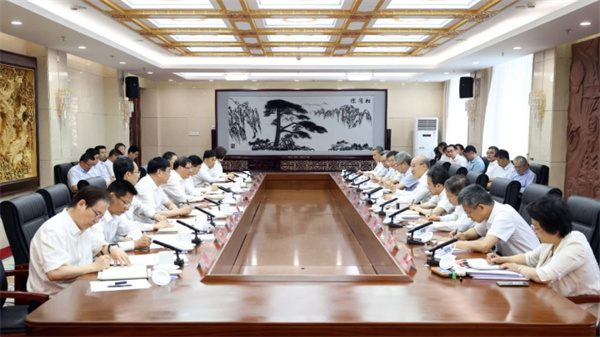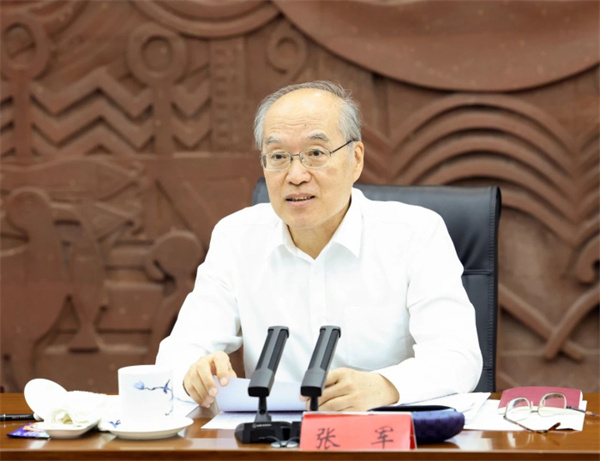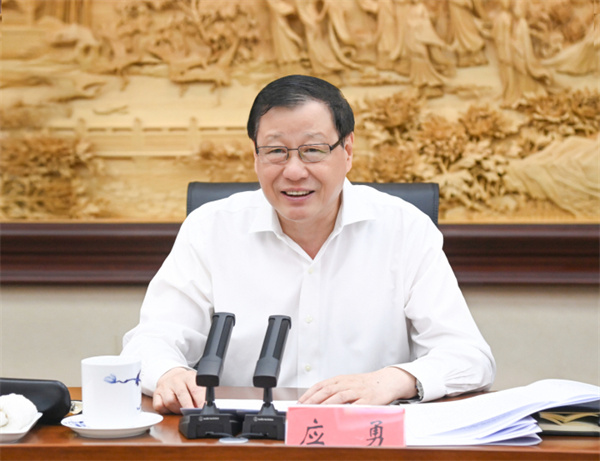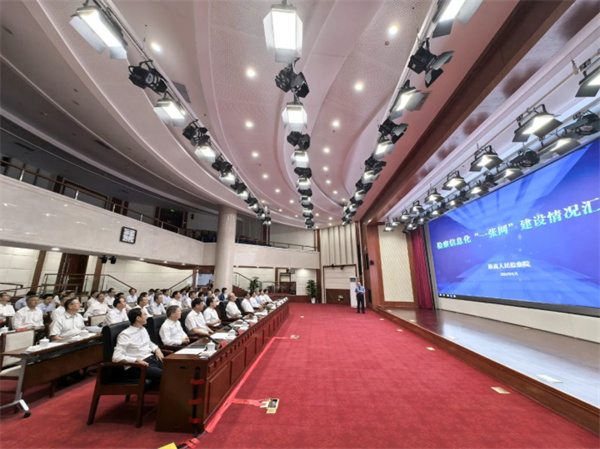SPP, SPC hold work exchange and consultation meeting

The Supreme People's Court and the Supreme People's Procuratorate (SPP) hold the second work exchange and consultation meeting at the SPP in Beijing on June 27. [Photo/court.gov.cn]

Zhang Jun, secretary of the Leading Party Members' Group and president of the Supreme People's Court, addresses the meeting. [Photo/court.gov.cn]

Ying Yong, secretary of the Leading Party Members' Group and prosecutor general of the Supreme People's Procuratorate, addresses the meeting. [Photo/court.gov.cn]

Participants hear a presentation on the development of IT application in the procuratorial field. [Photo/court.gov.cn]
The Supreme People's Court (SPC) and the Supreme People's Procuratorate (SPP) held the second work exchange and consultation meeting on June 27 at the SPP in Beijing, during which they discussed how to support and serve Chinese modernization through judicial modernization.
Zhang Jun, secretary of the Leading Party Members' Group and president of the SPC, and Ying Yong, secretary of the Leading Party Members' Group and prosecutor general of the SPP, attended the meeting and delivered speeches. Prior to the meeting, they heard a presentation on the development of IT application in the procuratorial field.
Since the first work exchange and consultation meeting last year, the SPC and the SPP have worked together to deliver on the minutes of that meeting. Most of the 29 specific tasks identified in the minutes have been completed or have witnessed significant progress.
Notable achievements have been made in improving the rate of second-instance hearings in criminal cases, enhancing communication and coordination mechanisms for judicial interpretations and case guidance, improving the system of procuratorial recommendations for civil and administrative retrials, and accessing case files and sub-files for civil and administrative litigation and enforcement cases.
These efforts have led to the establishment of a series of institutional mechanisms conducive to enhancing the quality and efficiency of judicial and procuratorial work, and effectively addressing long-standing issues that have hindered the development of judicial and procuratorial work.
During the meeting on June 27, Deng Xiuming, deputy secretary of the Leading Party Members' Group and executive vice-president of the SPC, presented the progress of tasks from the first work exchange and consultation meeting, while Tong Jianming, deputy secretary of the Leading Party Members' Group and first deputy prosecutor general of the SPP, introduced the agenda and related considerations for the second meeting.
Leaders from the two judicial organs engaged in in-depth discussions on a range of issues, including ensuring judges and prosecutors fulfill their duties in accordance with the law, applying leniency in the system of confession and acceptance of punishment, judicial supervision and constraint of judicial power, and judicial informatization construction.
They reached a consensus on exploring the establishment of a governance system for governance of minor offenses with Chinese characteristics, researching and formulating standards for the procuratorial and judicial work on technology-related intellectual property rights and anti-monopoly cases, enhancing information exchanges and sharing in the handling of criminal appeal cases, improving the quality and efficiency of handling death penalty review cases, increasing the exchange of judicial data and the sharing of big data models, and the mutual exchange and training of personnel between courts and procuratorates.
Zhang pointed out that such meetings between the two sides are effective measures to implement Xi Jinping Thought on the Rule of Law and translate the strengths of socialism with Chinese characteristics into tangible outcomes in the judicial field.
Over the past year, the joint efforts of the two judicial authorities in implementing the outcomes of the first meeting have led to the resolution of a series of longstanding issues in their respective fields, Zhang said, adding that in the next step, efforts should be made to achieve more practical results.
He called for promoting procuratorial supervision to improve the quality and efficiency of judicial adjudication work, to enhance the public's sense of fairness and justice.
It is essential to take a problem-oriented approach to address weak links in management and institutional setup, he said.
While underlining the need to address both symptoms and root causes of related problems, Zhang encouraged the use of the work exchange and consultation meeting to resolve specific issues in judicial adjudication and procuratorial oversight, as well as to summarize and refine practices into systems to accumulate practical experience for the continued deepening of judicial reforms.
It is crucial to strengthen follow-up supervision, ensure work responsibility fulfillment, maintain ongoing work exchanges, and demonstrate the positive role of this meeting mechanism through practical and effective achievements, he said.
Ying highlighted that the consultation meetings between the two highest judicial authorities are practical measures for courts and procuratorates to collectively study and implement Xi Jinping Thought on the Rule of Law, jointly address major issues in judicial practices, and strive to ensure that "the people feel fairness and justice in every judicial case."
Many of the common problems encountered in the work of the two judicial authorities are closely related to the country's overall reform and development, the quality and efficiency of judicial case handling, and the development of the legal team, he said.
He underscored the need to deepen collaboration and coordination, and to strengthen mutual oversight between the two authorities to continuously improve the quality and efficiency of adjudication and procuratorial work, better serve the country's overall development, ensure justice for the people, and take on their due responsibility of promoting the rule of law.
The SPP will work together with the SPC to continuously consolidate and expand the outcomes of the consultation meetings, strengthen overall coordination and guidance, ensure the effective implementation of various tasks from the meetings, and jointly promote judicial justice, Ying added.
Also present at the meeting were Li Chenglin, member of the Leading Party Members' Group and head of the Political Department of the SPC; Mao Zhonghua, member of the Leading Party Members' Group of the SPC; Zhang Xueqiao, deputy prosecutor general of the SPP; Chen Guoqing, member of the Leading Party Members’ Group and deputy prosecutor general of the SPP; Teng Jiguo, member of the Leading Party Members’ Group and head of the Political Department of the SPP; Shi Weizhong, standing member of the Procuratorial Committee of the SPP (vice-minister level); and other relevant officials from the two judicial authorities.







